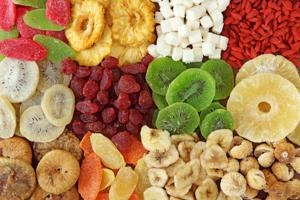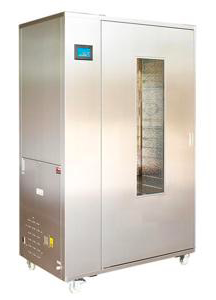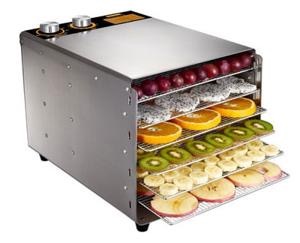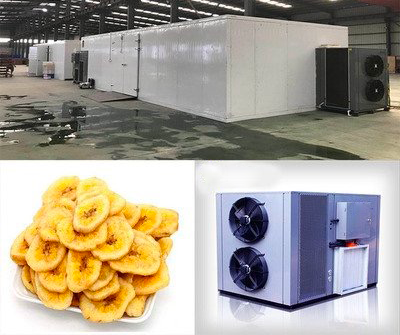
Content Menu
● Introduction
● What Is a Ventless Heat Pump Dryer?
>> How Does a Ventless Heat Pump Dryer Work?
● Advantages of Using Ventless Heat Pump Dryers for Food Processing
>> Energy Efficiency
>> Space-Saving Design
>> Gentle Drying Process
>> Versatility
>> Reduced Environmental Impact
● Applications of Food Dryers
● Factors to Consider When Choosing a Food Dryer
● Maintenance Tips for Ventless Heat Pump Dryers
● Understanding Different Types of Food Dryers
>> 1. Convection Dryers
>> 2. Freeze Dryers
>> 3. Microwave Dryers
>> 4. Infrared Dryers
>> 5. Ventless Heat Pump Dryers
● Innovations in Food Drying Technology
>> Smart Technology Integration
>> Enhanced Automation Features
>> Sustainable Practices
● Case Studies of Successful Food Drying Operations
>> Case Study 1: Fruit Snack Manufacturer
>> Case Study 2: Organic Herb Supplier
● Conclusion
● Frequently Asked Questions
>> 1. What types of foods can be dried using a ventless heat pump dryer?
>> 2. How does a ventless heat pump dryer compare to traditional drying methods?
>> 3. What maintenance is required for ventless heat pump dryers?
>> 4. Can ventless heat pump dryers be used in small spaces?
>> 5. How long does it typically take to dry foods using this technology?
Introduction
In the world of food processing, drying is a crucial step that enhances the shelf life and quality of various food products. As a leading manufacturer of food drying machines in China, we provide OEM services to international brands, wholesalers, and producers. This article explores the technology behind food dryers, particularly focusing on how ventless heat pump dryers work efficiently to dry food products.

What Is a Ventless Heat Pump Dryer?
A ventless heat pump dryer is an innovative appliance that utilizes a heat pump system to dry items without the need for external venting. Unlike traditional dryers that expel hot air outside, ventless heat pump dryers recycle air within the machine. This not only makes them more energy-efficient but also allows them to be installed in various locations without the need for external ductwork.
How Does a Ventless Heat Pump Dryer Work?
The operation of a ventless heat pump dryer can be broken down into several key steps:
1. Air Intake: The dryer draws in air from the surrounding environment.
2. Heating Process: The air is then heated using a heat pump system. This system uses refrigerant to absorb heat from the air and transfer it to the dryer drum.
3. Drying Cycle: The heated air is circulated through the drum containing the food items, where it absorbs moisture.
4. Moisture Removal: The moisture-laden air is then passed through a condenser, where it cools down. As it cools, the moisture condenses back into water and is collected in a reservoir.
5. Recycling Air: The now-dry air is reheated and recirculated back into the drum, continuing the drying process until the desired moisture content is achieved.
This cycle repeats until the food reaches optimal dryness, ensuring that nutrients are preserved while eliminating harmful bacteria.
Advantages of Using Ventless Heat Pump Dryers for Food Processing
Energy Efficiency
One of the standout features of ventless heat pump dryers is their energy efficiency. By recycling air and using lower drying temperatures, these dryers consume significantly less energy compared to traditional methods. This is particularly beneficial for large-scale food processing operations where energy costs can be substantial.
Space-Saving Design
Ventless heat pump dryers do not require external venting, allowing for flexible installation options. This is especially advantageous for businesses with limited space or those looking to optimize their production areas.
Gentle Drying Process
The lower temperatures used in heat pump drying help preserve the quality of food products. This gentle drying process retains flavors, colors, and nutritional value better than conventional drying methods.
Versatility
These dryers can handle a wide variety of food products, including fruits, vegetables, herbs, and meats. Their adaptability makes them an excellent choice for diverse food processing needs.

Reduced Environmental Impact
By consuming less energy and not requiring external venting, ventless heat pump dryers contribute to a lower carbon footprint. This aligns with sustainable practices that are increasingly important in today's food industry.
Applications of Food Dryers
Food dryers are used in various sectors within the food industry:
- Fruit and Vegetable Processing: Drying fruits and vegetables enhances their shelf life and makes them suitable for snacks or ingredients in other products.
- Herb Drying: Herbs retain their flavor when dried properly, making them ideal for culinary uses or herbal supplements.
- Meat Processing: Dehydrating meats can create jerky or extend shelf life for other meat products.
- Snack Production: Many snacks are made from dried ingredients; thus, having an efficient drying process is critical for quality control.
Factors to Consider When Choosing a Food Dryer
When selecting a dryer for your food processing needs, consider the following factors:
- Capacity: Choose a dryer that meets your production volume requirements.
- Energy Consumption: Look for models with high energy efficiency ratings to save on operational costs.
- Temperature Control: Ensure the dryer has adjustable temperature settings to accommodate different types of foods.
- Ease of Use: User-friendly controls and maintenance features can save time and reduce labor costs.
- Durability: A robust design will ensure longevity and reliability in your production line.
Maintenance Tips for Ventless Heat Pump Dryers
To ensure optimal performance and longevity of your ventless heat pump dryer, follow these maintenance tips:
1. Regular Cleaning: Clean filters and condensate tanks regularly to prevent clogs and maintain airflow efficiency.
2. Check Seals: Inspect door seals for wear and tear to ensure no air leaks occur during operation.
3. Monitor Performance: Keep an eye on drying times; if they increase significantly, it may indicate a need for maintenance or repair.
4. Professional Servicing: Schedule regular professional maintenance checks to keep your dryer in top condition.
5. User Manual Compliance: Always refer to the manufacturer's manual for specific maintenance guidelines tailored to your model.
Understanding Different Types of Food Dryers
When considering food drying technologies, it's essential to understand the different types available on the market:
1. Convection Dryers
Convection dryers use hot air circulation to remove moisture from food products. They are effective but can be less energy-efficient compared to heat pump dryers due to higher operating temperatures.
2. Freeze Dryers
Freeze drying involves freezing food items first and then removing moisture through sublimation under vacuum conditions. While this method preserves nutrients exceptionally well, it is often more expensive than other drying methods due to high energy consumption and equipment costs.
3. Microwave Dryers
Microwave dryers utilize microwave radiation to heat water molecules within food items rapidly. This method can significantly reduce drying times but may lead to uneven drying if not carefully monitored.
4. Infrared Dryers
Infrared dryers use infrared radiation to directly heat food surfaces, leading to quick moisture removal. While effective for certain applications, they may not be suitable for all types of foods due to potential surface burning or uneven heating.
5. Ventless Heat Pump Dryers
As discussed earlier, ventless heat pump dryers offer unique advantages through their energy efficiency and gentle drying capabilities, making them increasingly popular in various food processing applications.
Innovations in Food Drying Technology
The field of food drying technology continues to evolve with advancements aimed at improving efficiency and product quality:
Smart Technology Integration
Many modern food dryers now feature smart technology integration that allows users to monitor and control drying processes remotely via smartphone apps or computer interfaces. This innovation enhances convenience and allows for real-time adjustments based on specific product needs.
Enhanced Automation Features
Automation features such as automatic moisture detection sensors enable dryers to adjust temperature and cycle times based on real-time data about the moisture content of foods being dried. This leads to more consistent results while reducing labor costs associated with manual monitoring.
Sustainable Practices
As sustainability becomes increasingly important in all industries, manufacturers are focusing on developing more eco-friendly drying solutions that minimize waste and energy consumption while maximizing product quality.
Case Studies of Successful Food Drying Operations
To illustrate the effectiveness of ventless heat pump dryers in real-world applications, consider these case studies:
Case Study 1: Fruit Snack Manufacturer
A fruit snack manufacturer implemented ventless heat pump dryers into their production line after struggling with high energy costs using traditional convection dryers. They reported a 30% reduction in energy consumption while maintaining superior product quality—resulting in increased customer satisfaction and repeat business due to improved flavor retention in their snacks.
Case Study 2: Organic Herb Supplier
An organic herb supplier transitioned from freeze-drying technology to ventless heat pump dryers after discovering that their previous method was too costly and time-consuming. The new system allowed them greater flexibility in production schedules while preserving essential oils better than before—leading to enhanced flavor profiles in their dried herbs which ultimately boosted sales by 25%.
Conclusion
Ventless heat pump dryers represent a significant advancement in food drying technology. Their efficient operation not only conserves energy but also enhances product quality by providing a gentle drying process. As manufacturers continue to innovate in this space, ventless heat pump dryers are likely to become an essential tool in food processing facilities around the world.
By understanding how these machines work and their benefits, businesses can make informed decisions about their drying processes—ultimately leading to better product quality and increased profitability.

Frequently Asked Questions
1. What types of foods can be dried using a ventless heat pump dryer?
Ventless heat pump dryers can effectively dry various foods including fruits, vegetables, herbs, meats, and snacks due to their adjustable temperature settings and gentle drying process.
2. How does a ventless heat pump dryer compare to traditional drying methods?
Ventless heat pump dryers are more energy-efficient than traditional methods as they recycle air within the machine instead of expelling it outside, leading to lower operational costs and better preservation of food quality.
3. What maintenance is required for ventless heat pump dryers?
Regular cleaning of filters and condensate tanks, checking door seals for leaks, monitoring performance for any changes in drying times, scheduling professional servicing, and adhering to user manual guidelines are essential maintenance tasks.
4. Can ventless heat pump dryers be used in small spaces?
Yes! One of the main advantages of ventless heat pump dryers is their compact design that does not require external venting, making them ideal for small spaces like apartments or limited production areas.
5. How long does it typically take to dry foods using this technology?
The drying time varies depending on the type of food being dried and its moisture content; however, ventless heat pump dryers generally operate at lower temperatures which may result in longer drying times compared to traditional methods but yield better quality results overall.
By expanding upon these elements within our original article structure while integrating additional insights into technologies used within modern-day operations—this comprehensive guide serves as both an educational resource as well as practical reference point for those interested exploring options available when considering investing into effective solutions tailored towards maximizing efficiency throughout their respective processes!












